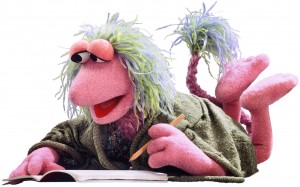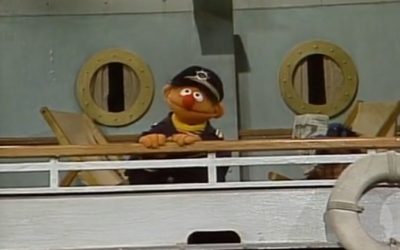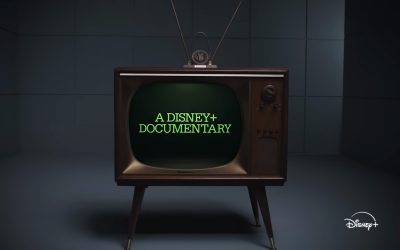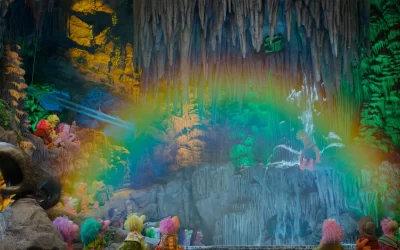Part 1: The Muppet Show and The Muppet Movie
Part 2: Fraggle Rock, The Dark Crystal, and Star Wars
Part 3: More Fraggles, Little Muppet Monsters, and No Strings USA
Audio version
Here we are, with the third and final segment of our epic interview with the incomparable Kathy Mullen! Read on to get more of her thoughts on Fraggle Rock, as well as productions like Little Muppet Monsters, The Wubbulous World of Dr. Seuss, Labyrinth, and The Christmas Toy!
You’ll also read all about her current project, No Strings USA. Once again, we ask that you consider donating to their Indiegogo campaign, which is raising money to create puppet films for children living in Syrian refugee camps. Click here to learn more about the campaign and how you can help.
Finally, if you’ve been waiting to listen to this entire interview rather than waste all that time reading the words, the audio version is now available! Click here to listen to our conversation with Kathy Mullen in full, podcast-style!
And now, the conclusion of our interview with Muppeteer Kathy Mullen!
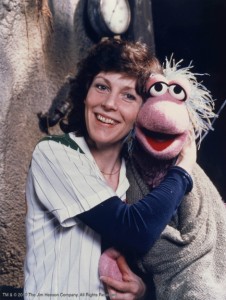 ToughPigs: You’re going to be bringing Mokey back for Dragon Con next month. Is this your first time performing Mokey since the show ended?
ToughPigs: You’re going to be bringing Mokey back for Dragon Con next month. Is this your first time performing Mokey since the show ended?
Kathy Mullen: Oh, yes!
TP: Have you been practicing? Are you ready?
KM: Nooo! Do I remember the voice? Nooo!
TP: Have you been with the puppet?
KM: Nooo!
TP: It’s a little intimidating then?
KM: No.
TP: Do you think you’re going to be able to jump back into it?
KM: I don’t care… whatever comes out is what’s going to come out.
TP: Did you see the Ben Folds Five video?
KM: Yeah, whoever did it, did fine. I thought everybody did fine. It was good. Weird, but good.
TP: In the early-to-mid ‘90s, there was a TV appearance with Traveling Matt and Cotterpin to promote Fraggle Rock on home video…
KM: I have no recollection of that whatsoever. Maybe I didn’t do it. Maybe I did it. [Editor’s note: She did.]
 TP: Oh, I assumed there’d have to be more preparation…
TP: Oh, I assumed there’d have to be more preparation…
KM: [Laughs] That’s just a silly assumption. No, we didn’t do a lot of preparation for that stuff. As a matter of fact, most of those things were ad-libbed. When Jim and Frank would go do that stuff, they were pretty much always ad-lib… Frank was brilliant at it. He was just knock-down funny. And nobody’s been able to do with Piggy what Frank did. Nobody! They can imitate the voice really, really well, and they can do some really great manipulation, but what I haven’t seen since Frank stopped is the comedy. Personally you wouldn’t know Frank’s such a funny guy because he’s Mr. Deadpan. If you don’t know him, you just think, “Oh, he’s so mean!”
I’ll tell you a story about Frank. Wendy and Brian [Froud] were getting married in the UK, and we all went down to wherever it was in the country. Big heels were in, and I got out of the truck at the wedding and I sprained my ankle so badly that I couldn’t walk. Who was the one who gets me to a room, gets me ice for my ankle, makes sure I’m okay? Frank. Who was the one who drives me home? Frank. Then just before doing Yoda, I had to go into the hospital because I had a breast lump and I had to have a biopsy. That was when breast cancer was not so well understood, and I was a little bit scared, I have to admit. I was in the hospital, and this huge bouquet of flowers arrives, and I think it’s from Michael, of course. But it was from Frank.
TP: You were credited as the co-writer for an animated Fraggle Rock episode called “Laundry Never Lies.” How did that come about?
KM: I pretended I was someone else. During Fraggles I started to write, and Jim wasn’t interested in me writing anything. There was a show (that wasn’t long on the air) called Little Muppet Monsters, which Michael was producing. I wrote for that, but I used another name, so Jim never knew it was me. He wouldn’t accept it, had it been me.
TP: What was the name?
 KM: Jessie Duggan, my great-grandmother. I was really just beginning to write then, and I had an idea for a script, but they changed it. It was just my early efforts, that’s all.
KM: Jessie Duggan, my great-grandmother. I was really just beginning to write then, and I had an idea for a script, but they changed it. It was just my early efforts, that’s all.
TP: Little Muppet Monsters seemed like it was going to get a big push from Henson.
KM: You know what happened? We were working with Marvel, who had done Muppet Babies. They were delivering a lot of the show’s animation. It had puppet wrap-arounds with a lot of animated bits and found footage. Three of them went on the air, and then Marvel didn’t deliver the animation on time. They blew it. The network said, “Shit, what are we going to do?” So they put another Muppet Babies on, two episodes back-to-back, the viewership shot up, and they said, “Forget Little Muppet Monsters,” and they just started playing Muppet Babies back to back.
TP: Have you ever seen the missing episodes of Little Muppet Monsters?
KM: We never finished them. The puppet wrap-arounds were done, but they never put the animation in. There were only three episodes ever. We shot thirteen puppet segments, but most of the money went into the animation. That was also the summer of Labyrinth.
TP: That’s a good segue. What did you do for Labyrinth?
KM: I don’t even know why I went over. Jim called me one day and said, “I need you.” I said, “Why? We’re doing Muppet Monsters!” He said, “I just need more people, I need more people, you have to come over.” “To do what?” “To be background.” I really just hung around under the stage with the rest of the guys and wiggled the Goblins. I kept worrying about getting back here and Michael not having me to help him on Monsters. It was only a week or so… for that big Bowie song… “Dance the Magic Dance,” what a silly song. [Laughs]
TP: Did you have any favorite Mokey or Cotterpin-centric Fraggle Rock episodes?
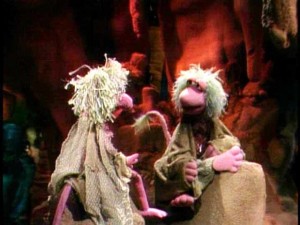 KM: One of the fun things for me to do was, Mokey had a doll of herself that she made, I don’t remember the episode [Editor’s note: It was “Mokey’s Funeral”], I think Jim was directing that. I was trying to figure out this song [raises both arms, struggling to perform both Mokey and the doll] and I couldn’t figure it out. I said to Jim, “How do I do this?” and Jim said, “You just stick a stick up the doll and do it like this [raises arms, dances much more smoothly]. She’s dead anyhow, she’s a doll.” Duh! I never thought of that!
KM: One of the fun things for me to do was, Mokey had a doll of herself that she made, I don’t remember the episode [Editor’s note: It was “Mokey’s Funeral”], I think Jim was directing that. I was trying to figure out this song [raises both arms, struggling to perform both Mokey and the doll] and I couldn’t figure it out. I said to Jim, “How do I do this?” and Jim said, “You just stick a stick up the doll and do it like this [raises arms, dances much more smoothly]. She’s dead anyhow, she’s a doll.” Duh! I never thought of that!
You know, we did our own choreography. Nobody ever choreographed anything for us. That way, I was able to get in front of a mirror with the doll on a stick and come up with a nice dance. That was fun for me to figure out that kind of thing. And I loved it when the five of us had something hard to do that we all had to do together. We had hard-wired microphones at the time, before the radio mics. There was one radio mic that we had, and the person who was the lead that week got to wear it. But that was only by the third season. So every time we had these crazy scenes with dancing and singing, our headsets would end up all tangled, we’d call it spaghetti, we’d have to go under and over and under and over each other’s wires to get untangled before we could do the next take.
TP: You played Apple in The Christmas Toy. Can you tell us anything about that production?
KM: It was up in Toronto. What I remember most about that, I had started to write at that time, and Jim was looking for a story for a Christmas thing and I’d written one. I gave it to him, and he said, “This is really good, but way too expensive,” so they did Christmas Toy.
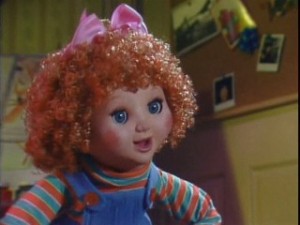 TP: But you didn’t perform Raisin, the replacement character for Apple in Secret Life of Toys.
TP: But you didn’t perform Raisin, the replacement character for Apple in Secret Life of Toys.
KM: No, I wasn’t involved at all. After that and Fraggles, I was hardly involved at all anymore. The last thing I did may have been Christmas Toy. I did little bits and pieces here and there.
TP: What was that driving force for you to take a step back from the Muppets?
KM: It had nothing to do with me, it was Jim. I think he had some other, younger women coming up that he thought were better. I don’t know, he wasn’t about to tell me. He just stopped hiring me.
TP: What did you do in those years?
KM: I wrote. About five or six years later, Marty Robinson called me and said he needed somebody to play the lead part in this thing in Florida, and it was Allegra’s Window. I went in and auditioned, and I ended up being Allegra. By that time, Jim was already gone.
TP: You have a few credits on The Wubbulous World of Dr. Seuss.
KM: That was Michael’s show. I helped Michael work on that, back-and-forth to London. It was very innovative at the time. Do you know how it was done?
TP: It was all green screen?
KM: It was all green screen, but the computer-generated backgrounds were all manipulated in live time with the puppets. We had a computer guy there on the set, and we were in front of the green screen, and we could see on the monitors the computer-generated sets. We would walk [in place] and he would move the sets. Say you’re walking along a fence, and the set is moving, and you get to a gate. You’ve got to stop together, the puppet has to do a move, and the gate has to open. So all that coordination has to happen in live time. It was very clever, but nobody had done it before, so there was a very steep learning curve. It was me and Michael and David Gumpel who developed that. I didn’t do a lot of the characters, but I did a lot of the development and eventually started directing. Second season, I started directing many of the CGI segments. Thank god, because by the time we got to Between the Lions, when we had a green screen character, I knew how to do it because I’d done it on Seuss. Now it’s no big deal, right?
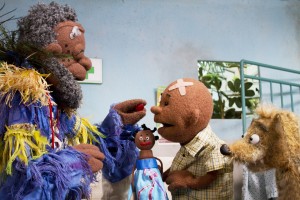 TP: Can you tell us about No Strings USA?
TP: Can you tell us about No Strings USA?
KM: Sure! After 9/11 we were looking for some way to help, particularly in Afghanistan when the bombings first started. We’d gotten friends together and said, “We’re puppet people, what can we do?” We didn’t come up with anything. And then I got a phone call one day from my sister, who said, “My daughter has just quit her job and run off to England with some guy. But that’s not why I’m calling. This guy’s flat mate is an aid worker who just came back from Afghanistan where he was building a bakery to feed 35,000 people in a camp who had been running from the American bombing, and he’d seen a lot of kids injured by landmines. He had a puppet that he used to take around with him, and it was falling apart. So Jesse [my neice] wants to know if you can fix his puppet.” I said sure, I’ll fix his puppet. Instead, I get a phone call from this guy named Johnie McGlade, and Johnie has this very thick Irish accent, so at first I couldn’t understand him. What he said was, “What I really want to do is a puppet show to teach these kids about landmines. Will you do it?” I said, “Yep, get yourself over here and we’ll do it.”
So we did, and we started out trying to plan a live show. We were planning to go into Afghanistan with a puppet show, teach local Afghans how to do it. It was going to be on a truck. We had this whole thing planned, and then the Taliban started coming in and killing aid workers, people were getting shot, and Johnie said we can’t do it, we can’t put people in danger like that. We had already built almost the whole thing, we’d been working on it for well over a year. Heather [Asch] and I built all the puppets except one or two. And we went, “Oh god… now what do we do?” Somebody said, “Why don’t we do a video?” How are we going to do a video? Where are we going to do a video? At that time, Pam Arciero had just taken over [as the Artistic Director] at the O’Neill [Puppetry Conference], and Heather said, “Talk to Pam.” So we talked about it, and she said, “Well, I don’t know, people have to come up there and stay here…” And I thought, “Forget about it. I can’t happen.” And the next thing you know, Pam called and said, “I didn’t mean to scare you off, we can do this.” I said, “Really? We can get people housed and everything?” And she said, “Yeah yeah yeah, we have enough.” So we did it at the O’Neill. It’s been showing in Afghanistan for a long time. So that’s how it all started.
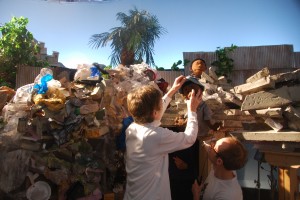 Right now we’re working on two films for refugee kids in Syria. We are mostly funded for those, but we need a bit more. We will be doing an Indiegogo campaign to help finish them.
Right now we’re working on two films for refugee kids in Syria. We are mostly funded for those, but we need a bit more. We will be doing an Indiegogo campaign to help finish them.
TP: Can you tell us about some of the incentives you’ll be giving to your Indiegogo donors?
KM: We’ve got bags with our characters on it. Michael’s going to do a poster, and we’ll do a limited edition signed print. We’ll do set visits, DVDs, screening party invittions, and that kind of thing. There are some other ones that I can’t remember, there’s a range depending on how much money you give. Keep your fingers crossed, because we don’t have enough money to finish without it. And we need to finish this by mid-October because we also do workshops. Johnie’s group, the UK-side of it, they do all the fieldwork. We do production, they’re fieldwork. He’s the one who goes to these dangerous places, he’s the one that sources the sound studio to do the dubbing in-country, he’s the one that runs workshops that teach delegates from NGOs working in the area how to use the films with the children, games to play, questions to ask, they learn how to use puppets. We give them lessons in puppetry so they can interact with the kids with the puppet in the classroom or in the community center or out in the field, wherever they are. In this case, it’s going to be in the refugee camps. We have those workshops scheduled for late-October, and the films have to be there. And he has to get the dubbing done. Some of these films are in ten different languages. That’s a lot!
TP: That’s not to mention the writing and puppet building and designing.
KM: Right, we do that up front. We’re building now. Heather is madly building right now, plus producing, plus she’s playing one of the main roles. Poor Heather!
TP: Well, we wish you the best of luck with the Indiegogo campaign, and we’ll do our best to spread the word.
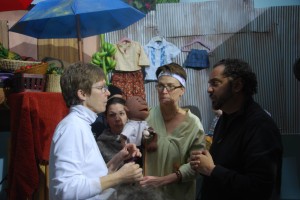 KM: Oh, you guys are so kind. That’s really, really wonderful. The puppet community can be very supportive, and puppeteers really care. Puppet people are great people! I mean, let’s face it, how many evil puppeteers do you know?
KM: Oh, you guys are so kind. That’s really, really wonderful. The puppet community can be very supportive, and puppeteers really care. Puppet people are great people! I mean, let’s face it, how many evil puppeteers do you know?
TP: Thank you so much for chatting with us! Do you have a message you want to send out to your Muppet fans and Fraggle fans out there?
KM: Yes, support puppetry. Because there’s a lot of live puppetry going on, there’s a little television puppetry here and there, and the Muppets are struggling to stay afloat and to stay relevant. It looks so kind of dead sometimes, it looks like you’ll never take off in that world because of all the CG. You can’t go backwards, so you just have to come up with that thing that’ll work for puppetry. Will it work in the media and in the movies again? If it’s not nostalgia, I don’t know. I’ll tell you where it does work… out in the developing world. This really works! So, support puppetry any way you can.
Many, many thanks to Kathy Mullen for joining us for this enlightening interview! And thanks to Michael Kirk Lane for his help in setting it up!
Click here to Dance the Magic Dance on the ToughPigs forum!
by Joe Hennes – Joe@ToughPigs.com

